Nursing Reflection: NURBN3023 - Airway Nurse Role in Patient Scenario
VerifiedAdded on 2022/08/08
|6
|1269
|31
Report
AI Summary
This report presents a nursing reflection on a clinical simulation where the student undertook the role of an airway nurse, managing a patient experiencing increased shortness of breath. The reflection utilizes Gibb's reflective cycle to analyze the experience, encompassing description, feelings, evaluation, analysis, conclusion, and an action plan. The student reflects on their responsibilities, including patient assessment, communication with the healthcare team, and implementation of interventions like medication administration and monitoring. The analysis highlights the importance of effective communication in patient-centered care and identifies areas for improvement, such as enhancing communication skills to address patient anxiety and concerns. The report concludes with a commitment to improve communication and patient-centered care in future clinical practice, referencing relevant literature and evidence-based guidelines.
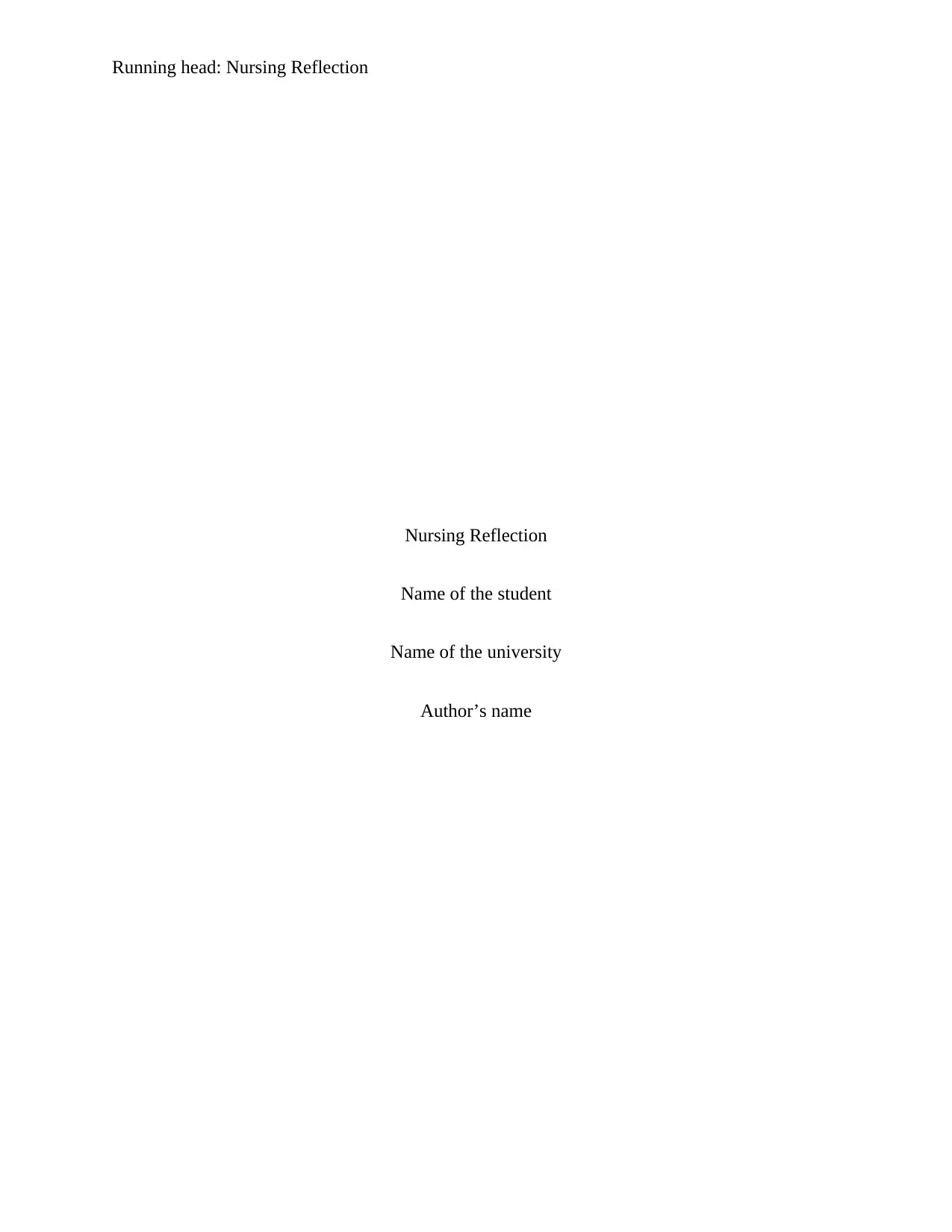
Running head: Nursing Reflection
Nursing Reflection
Name of the student
Name of the university
Author’s name
Nursing Reflection
Name of the student
Name of the university
Author’s name
Paraphrase This Document
Need a fresh take? Get an instant paraphrase of this document with our AI Paraphraser
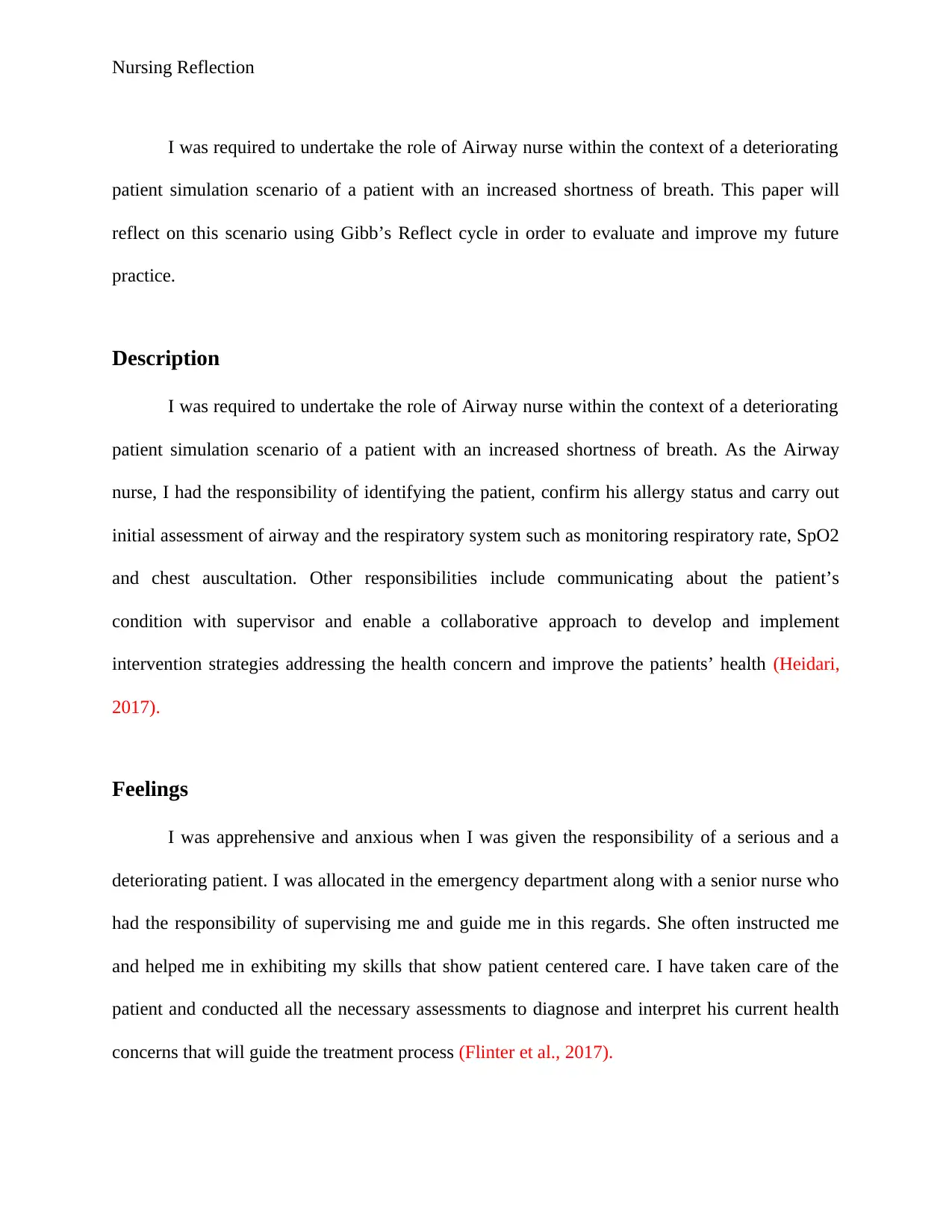
Nursing Reflection
I was required to undertake the role of Airway nurse within the context of a deteriorating
patient simulation scenario of a patient with an increased shortness of breath. This paper will
reflect on this scenario using Gibb’s Reflect cycle in order to evaluate and improve my future
practice.
Description
I was required to undertake the role of Airway nurse within the context of a deteriorating
patient simulation scenario of a patient with an increased shortness of breath. As the Airway
nurse, I had the responsibility of identifying the patient, confirm his allergy status and carry out
initial assessment of airway and the respiratory system such as monitoring respiratory rate, SpO2
and chest auscultation. Other responsibilities include communicating about the patient’s
condition with supervisor and enable a collaborative approach to develop and implement
intervention strategies addressing the health concern and improve the patients’ health (Heidari,
2017).
Feelings
I was apprehensive and anxious when I was given the responsibility of a serious and a
deteriorating patient. I was allocated in the emergency department along with a senior nurse who
had the responsibility of supervising me and guide me in this regards. She often instructed me
and helped me in exhibiting my skills that show patient centered care. I have taken care of the
patient and conducted all the necessary assessments to diagnose and interpret his current health
concerns that will guide the treatment process (Flinter et al., 2017).
I was required to undertake the role of Airway nurse within the context of a deteriorating
patient simulation scenario of a patient with an increased shortness of breath. This paper will
reflect on this scenario using Gibb’s Reflect cycle in order to evaluate and improve my future
practice.
Description
I was required to undertake the role of Airway nurse within the context of a deteriorating
patient simulation scenario of a patient with an increased shortness of breath. As the Airway
nurse, I had the responsibility of identifying the patient, confirm his allergy status and carry out
initial assessment of airway and the respiratory system such as monitoring respiratory rate, SpO2
and chest auscultation. Other responsibilities include communicating about the patient’s
condition with supervisor and enable a collaborative approach to develop and implement
intervention strategies addressing the health concern and improve the patients’ health (Heidari,
2017).
Feelings
I was apprehensive and anxious when I was given the responsibility of a serious and a
deteriorating patient. I was allocated in the emergency department along with a senior nurse who
had the responsibility of supervising me and guide me in this regards. She often instructed me
and helped me in exhibiting my skills that show patient centered care. I have taken care of the
patient and conducted all the necessary assessments to diagnose and interpret his current health
concerns that will guide the treatment process (Flinter et al., 2017).
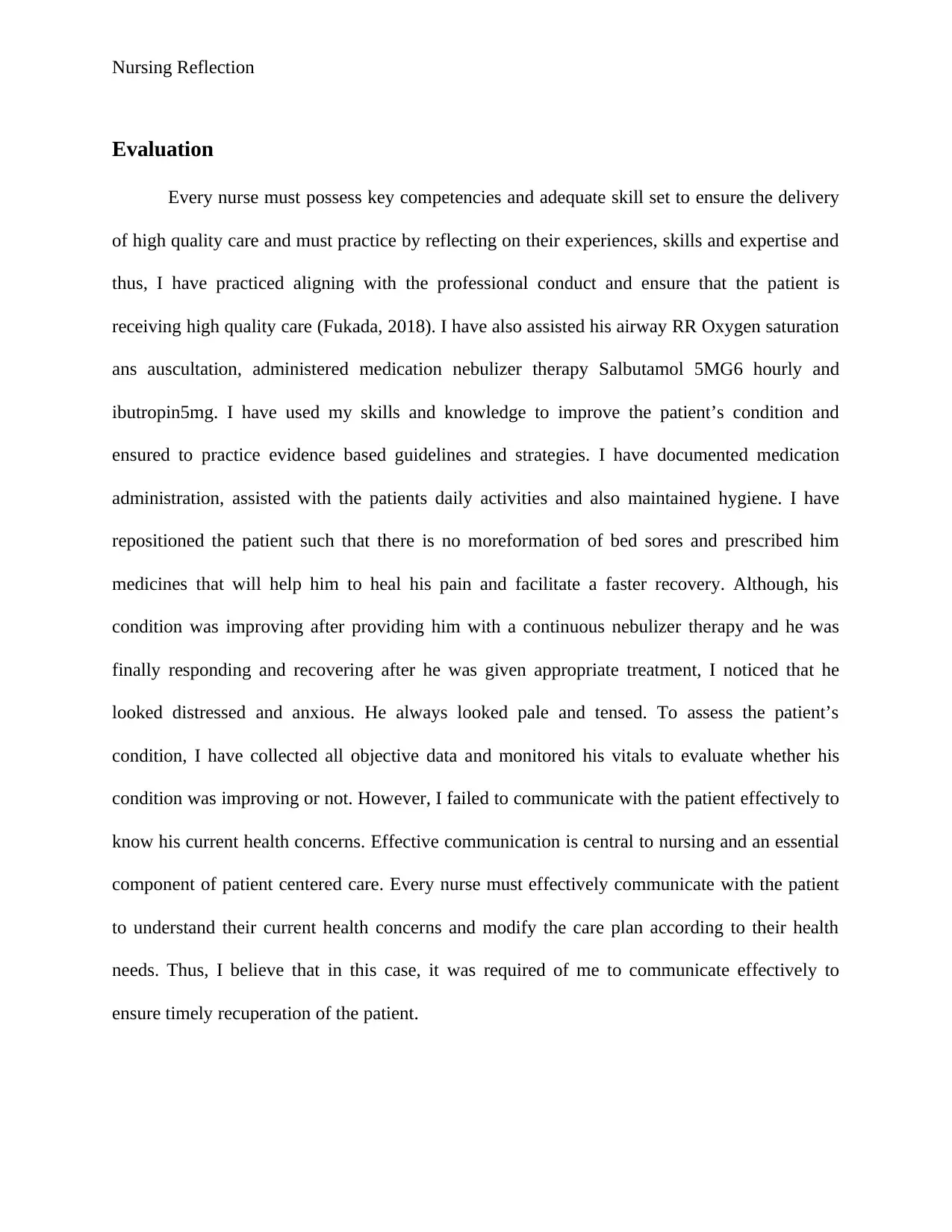
Nursing Reflection
Evaluation
Every nurse must possess key competencies and adequate skill set to ensure the delivery
of high quality care and must practice by reflecting on their experiences, skills and expertise and
thus, I have practiced aligning with the professional conduct and ensure that the patient is
receiving high quality care (Fukada, 2018). I have also assisted his airway RR Oxygen saturation
ans auscultation, administered medication nebulizer therapy Salbutamol 5MG6 hourly and
ibutropin5mg. I have used my skills and knowledge to improve the patient’s condition and
ensured to practice evidence based guidelines and strategies. I have documented medication
administration, assisted with the patients daily activities and also maintained hygiene. I have
repositioned the patient such that there is no moreformation of bed sores and prescribed him
medicines that will help him to heal his pain and facilitate a faster recovery. Although, his
condition was improving after providing him with a continuous nebulizer therapy and he was
finally responding and recovering after he was given appropriate treatment, I noticed that he
looked distressed and anxious. He always looked pale and tensed. To assess the patient’s
condition, I have collected all objective data and monitored his vitals to evaluate whether his
condition was improving or not. However, I failed to communicate with the patient effectively to
know his current health concerns. Effective communication is central to nursing and an essential
component of patient centered care. Every nurse must effectively communicate with the patient
to understand their current health concerns and modify the care plan according to their health
needs. Thus, I believe that in this case, it was required of me to communicate effectively to
ensure timely recuperation of the patient.
Evaluation
Every nurse must possess key competencies and adequate skill set to ensure the delivery
of high quality care and must practice by reflecting on their experiences, skills and expertise and
thus, I have practiced aligning with the professional conduct and ensure that the patient is
receiving high quality care (Fukada, 2018). I have also assisted his airway RR Oxygen saturation
ans auscultation, administered medication nebulizer therapy Salbutamol 5MG6 hourly and
ibutropin5mg. I have used my skills and knowledge to improve the patient’s condition and
ensured to practice evidence based guidelines and strategies. I have documented medication
administration, assisted with the patients daily activities and also maintained hygiene. I have
repositioned the patient such that there is no moreformation of bed sores and prescribed him
medicines that will help him to heal his pain and facilitate a faster recovery. Although, his
condition was improving after providing him with a continuous nebulizer therapy and he was
finally responding and recovering after he was given appropriate treatment, I noticed that he
looked distressed and anxious. He always looked pale and tensed. To assess the patient’s
condition, I have collected all objective data and monitored his vitals to evaluate whether his
condition was improving or not. However, I failed to communicate with the patient effectively to
know his current health concerns. Effective communication is central to nursing and an essential
component of patient centered care. Every nurse must effectively communicate with the patient
to understand their current health concerns and modify the care plan according to their health
needs. Thus, I believe that in this case, it was required of me to communicate effectively to
ensure timely recuperation of the patient.
⊘ This is a preview!⊘
Do you want full access?
Subscribe today to unlock all pages.

Trusted by 1+ million students worldwide
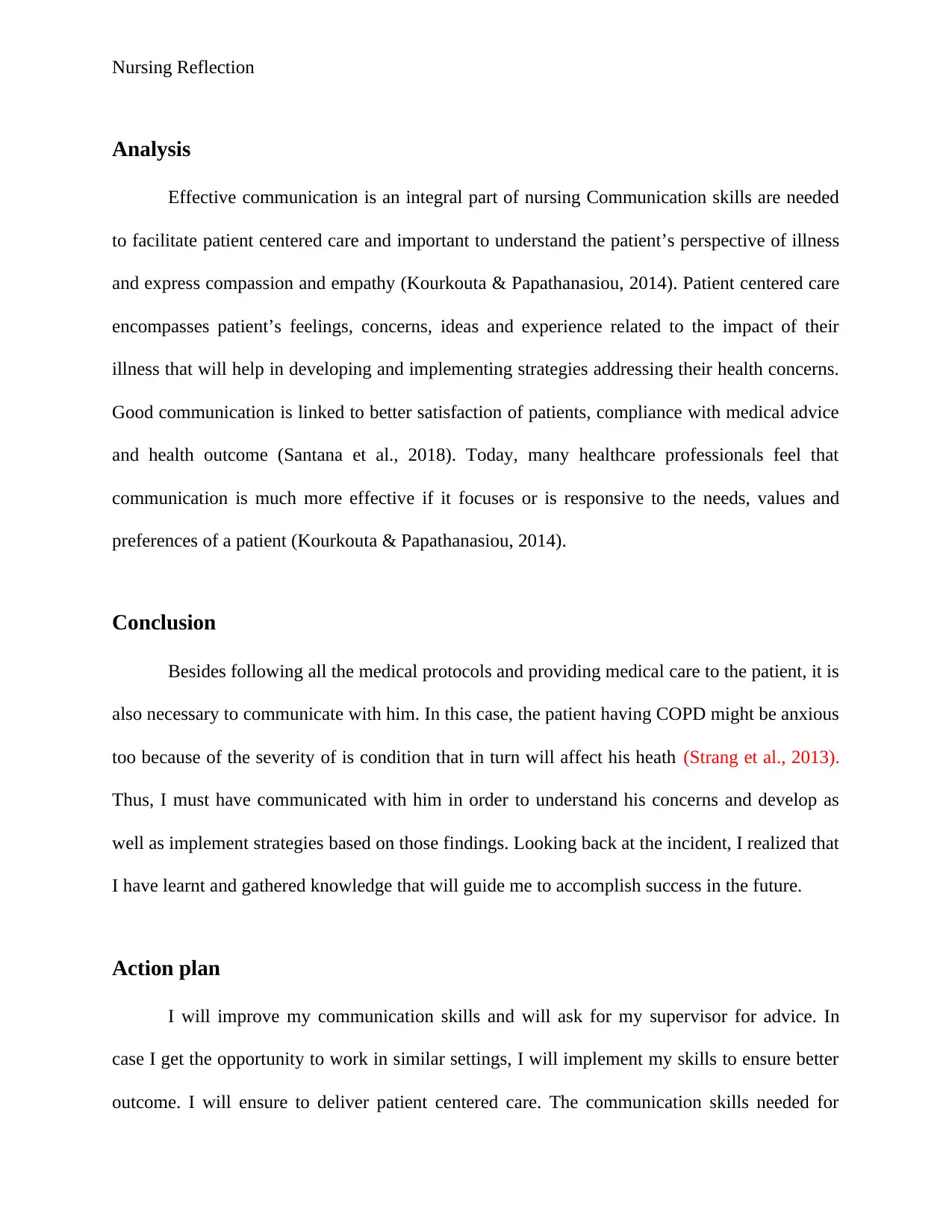
Nursing Reflection
Analysis
Effective communication is an integral part of nursing Communication skills are needed
to facilitate patient centered care and important to understand the patient’s perspective of illness
and express compassion and empathy (Kourkouta & Papathanasiou, 2014). Patient centered care
encompasses patient’s feelings, concerns, ideas and experience related to the impact of their
illness that will help in developing and implementing strategies addressing their health concerns.
Good communication is linked to better satisfaction of patients, compliance with medical advice
and health outcome (Santana et al., 2018). Today, many healthcare professionals feel that
communication is much more effective if it focuses or is responsive to the needs, values and
preferences of a patient (Kourkouta & Papathanasiou, 2014).
Conclusion
Besides following all the medical protocols and providing medical care to the patient, it is
also necessary to communicate with him. In this case, the patient having COPD might be anxious
too because of the severity of is condition that in turn will affect his heath (Strang et al., 2013).
Thus, I must have communicated with him in order to understand his concerns and develop as
well as implement strategies based on those findings. Looking back at the incident, I realized that
I have learnt and gathered knowledge that will guide me to accomplish success in the future.
Action plan
I will improve my communication skills and will ask for my supervisor for advice. In
case I get the opportunity to work in similar settings, I will implement my skills to ensure better
outcome. I will ensure to deliver patient centered care. The communication skills needed for
Analysis
Effective communication is an integral part of nursing Communication skills are needed
to facilitate patient centered care and important to understand the patient’s perspective of illness
and express compassion and empathy (Kourkouta & Papathanasiou, 2014). Patient centered care
encompasses patient’s feelings, concerns, ideas and experience related to the impact of their
illness that will help in developing and implementing strategies addressing their health concerns.
Good communication is linked to better satisfaction of patients, compliance with medical advice
and health outcome (Santana et al., 2018). Today, many healthcare professionals feel that
communication is much more effective if it focuses or is responsive to the needs, values and
preferences of a patient (Kourkouta & Papathanasiou, 2014).
Conclusion
Besides following all the medical protocols and providing medical care to the patient, it is
also necessary to communicate with him. In this case, the patient having COPD might be anxious
too because of the severity of is condition that in turn will affect his heath (Strang et al., 2013).
Thus, I must have communicated with him in order to understand his concerns and develop as
well as implement strategies based on those findings. Looking back at the incident, I realized that
I have learnt and gathered knowledge that will guide me to accomplish success in the future.
Action plan
I will improve my communication skills and will ask for my supervisor for advice. In
case I get the opportunity to work in similar settings, I will implement my skills to ensure better
outcome. I will ensure to deliver patient centered care. The communication skills needed for
Paraphrase This Document
Need a fresh take? Get an instant paraphrase of this document with our AI Paraphraser
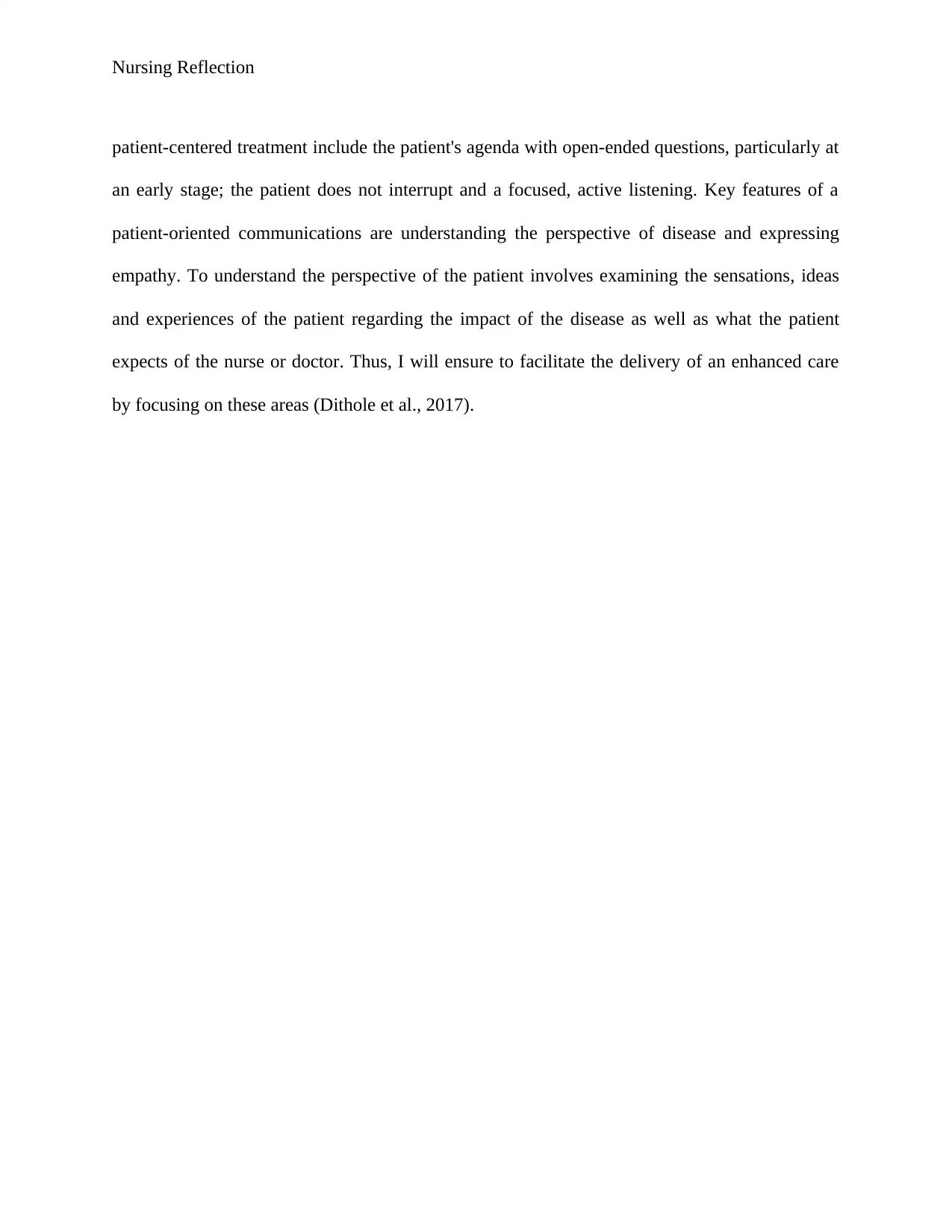
Nursing Reflection
patient-centered treatment include the patient's agenda with open-ended questions, particularly at
an early stage; the patient does not interrupt and a focused, active listening. Key features of a
patient-oriented communications are understanding the perspective of disease and expressing
empathy. To understand the perspective of the patient involves examining the sensations, ideas
and experiences of the patient regarding the impact of the disease as well as what the patient
expects of the nurse or doctor. Thus, I will ensure to facilitate the delivery of an enhanced care
by focusing on these areas (Dithole et al., 2017).
patient-centered treatment include the patient's agenda with open-ended questions, particularly at
an early stage; the patient does not interrupt and a focused, active listening. Key features of a
patient-oriented communications are understanding the perspective of disease and expressing
empathy. To understand the perspective of the patient involves examining the sensations, ideas
and experiences of the patient regarding the impact of the disease as well as what the patient
expects of the nurse or doctor. Thus, I will ensure to facilitate the delivery of an enhanced care
by focusing on these areas (Dithole et al., 2017).
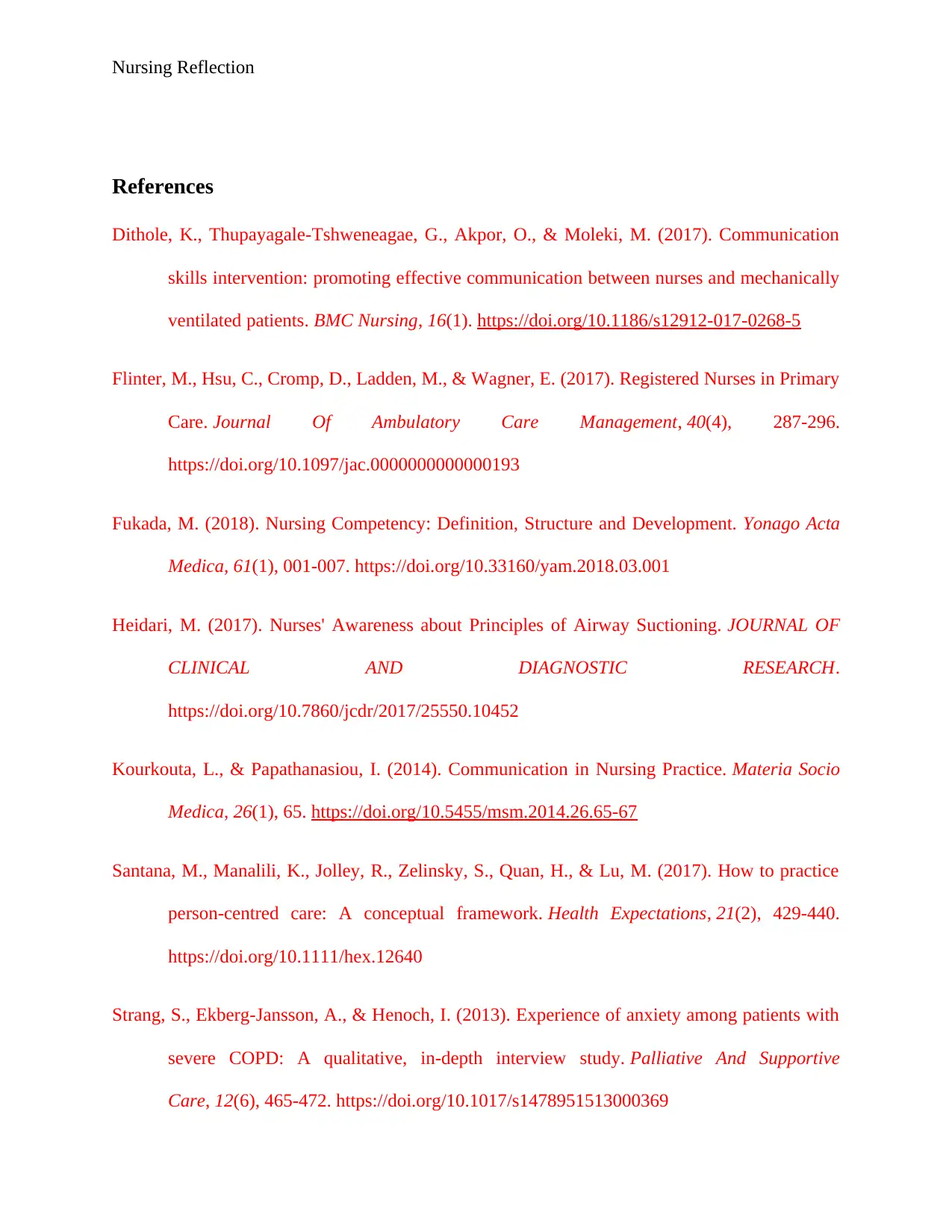
Nursing Reflection
References
Dithole, K., Thupayagale-Tshweneagae, G., Akpor, O., & Moleki, M. (2017). Communication
skills intervention: promoting effective communication between nurses and mechanically
ventilated patients. BMC Nursing, 16(1). https://doi.org/10.1186/s12912-017-0268-5
Flinter, M., Hsu, C., Cromp, D., Ladden, M., & Wagner, E. (2017). Registered Nurses in Primary
Care. Journal Of Ambulatory Care Management, 40(4), 287-296.
https://doi.org/10.1097/jac.0000000000000193
Fukada, M. (2018). Nursing Competency: Definition, Structure and Development. Yonago Acta
Medica, 61(1), 001-007. https://doi.org/10.33160/yam.2018.03.001
Heidari, M. (2017). Nurses' Awareness about Principles of Airway Suctioning. JOURNAL OF
CLINICAL AND DIAGNOSTIC RESEARCH.
https://doi.org/10.7860/jcdr/2017/25550.10452
Kourkouta, L., & Papathanasiou, I. (2014). Communication in Nursing Practice. Materia Socio
Medica, 26(1), 65. https://doi.org/10.5455/msm.2014.26.65-67
Santana, M., Manalili, K., Jolley, R., Zelinsky, S., Quan, H., & Lu, M. (2017). How to practice
person-centred care: A conceptual framework. Health Expectations, 21(2), 429-440.
https://doi.org/10.1111/hex.12640
Strang, S., Ekberg-Jansson, A., & Henoch, I. (2013). Experience of anxiety among patients with
severe COPD: A qualitative, in-depth interview study. Palliative And Supportive
Care, 12(6), 465-472. https://doi.org/10.1017/s1478951513000369
References
Dithole, K., Thupayagale-Tshweneagae, G., Akpor, O., & Moleki, M. (2017). Communication
skills intervention: promoting effective communication between nurses and mechanically
ventilated patients. BMC Nursing, 16(1). https://doi.org/10.1186/s12912-017-0268-5
Flinter, M., Hsu, C., Cromp, D., Ladden, M., & Wagner, E. (2017). Registered Nurses in Primary
Care. Journal Of Ambulatory Care Management, 40(4), 287-296.
https://doi.org/10.1097/jac.0000000000000193
Fukada, M. (2018). Nursing Competency: Definition, Structure and Development. Yonago Acta
Medica, 61(1), 001-007. https://doi.org/10.33160/yam.2018.03.001
Heidari, M. (2017). Nurses' Awareness about Principles of Airway Suctioning. JOURNAL OF
CLINICAL AND DIAGNOSTIC RESEARCH.
https://doi.org/10.7860/jcdr/2017/25550.10452
Kourkouta, L., & Papathanasiou, I. (2014). Communication in Nursing Practice. Materia Socio
Medica, 26(1), 65. https://doi.org/10.5455/msm.2014.26.65-67
Santana, M., Manalili, K., Jolley, R., Zelinsky, S., Quan, H., & Lu, M. (2017). How to practice
person-centred care: A conceptual framework. Health Expectations, 21(2), 429-440.
https://doi.org/10.1111/hex.12640
Strang, S., Ekberg-Jansson, A., & Henoch, I. (2013). Experience of anxiety among patients with
severe COPD: A qualitative, in-depth interview study. Palliative And Supportive
Care, 12(6), 465-472. https://doi.org/10.1017/s1478951513000369
⊘ This is a preview!⊘
Do you want full access?
Subscribe today to unlock all pages.

Trusted by 1+ million students worldwide
1 out of 6
Related Documents
Your All-in-One AI-Powered Toolkit for Academic Success.
+13062052269
info@desklib.com
Available 24*7 on WhatsApp / Email
![[object Object]](/_next/static/media/star-bottom.7253800d.svg)
Unlock your academic potential
Copyright © 2020–2026 A2Z Services. All Rights Reserved. Developed and managed by ZUCOL.





